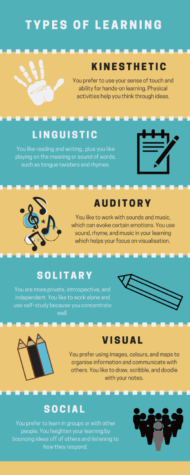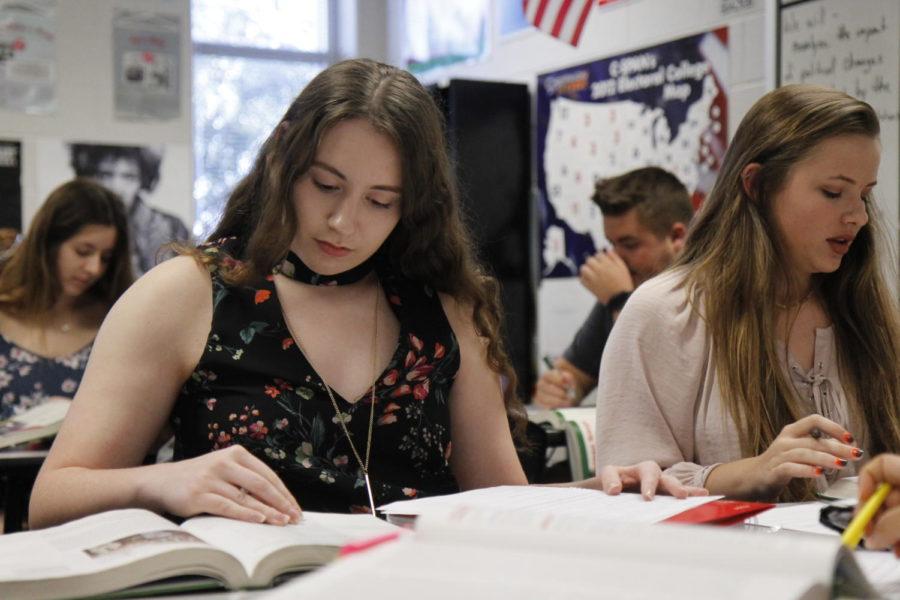Your donation will support the student journalists of Mansfield Legacy High School. Your contribution will allow us to purchase equipment and cover our annual website hosting costs and travel to media workshops.
Tricks of the Top Ten Percent
Students Reveal Their Successful Study Habits
February 8, 2018
The top ten percent – the people students envy. Intelligent, confident and academically successful. They’ve got a bright future ahead of them, colleges want them, and parents wish they were their kids. They may be highly intelligent, but does it come naturally? Or do they spend hours each evening, studying to perfect their knowledge on each subject?
Junior Kaitlin Nguyen takes six Advanced Placement courses each semester plus debate. She attributes her academic success to one key thing: a planner. Organization may be the success for one student, but spending hours of studying each afternoon may be another student’s success.
“Staying organized,” Nguyen said. “If I didn’t have my planner I wouldn’t know when tests or quizzes were, or when things are due, because there’s a lot happening, especially if you’re taking AP courses.”
Study methods vary from student to student. Major study habits include time management, setting time aside to complete assignments ahead of time, taking notes in class to look over at home and asking questions in class to further the conversation. Finding a student’s style of learning can help them not only in the classroom, but outside of school when retaining information.
Margaret Vo, ranked in the top ten of the senior class, has her own struggles when it comes to being able to study. Students who often excel in their academics don’t always lock themselves away in their room, but hide out in a teacher’s room to better understand the topic they couldn’t fully grasp in class.
“I mostly learn through tutoring,” Vo said. “I struggle with learning things on my own. If you see me after school, you’ll usually see me in a teacher’s classroom asking a bunch of questions.”
Listening to music, silent rooms, physical, auditory and kinesthetic learning show some of the few ways high-ranking students help them focus better. Each student has their own preferred method of studying, and teachers want to aid students when they need help finding what works best for them.
“I enjoy talking,” Vo said. “So, I talk through it to myself. I’m not hands-on, but I like to interact with text, so if it’s a physical copy of a textbook, I like to highlight through that. I like to have physical flash cards instead of quizlet.”

Students who work hard in their studies often find themselves rewarded with their position in the top 10% ranking of their class. Senior Lindsey Blakely, for example, uses her office aide block to catch up on homework and study for core classes. While Blakely recognizes there are different ways to go about it, she believes some hard work must get done to feel sufficiently prepared.
“I think there are people who are intelligent, but they still have to learn some things,” Blakely said. “If they don’t start studying, it’s going to really hurt them when they go to college and they don’t know all of the materials. It’s just going to hurt them in the long run.”
Efficient study habits are not just helpful tools for high school – they can also prepare students for the rigorous coursework in college. The equivalent of college courses in a high school setting are noted as Advanced Placement courses. These classes often fill with students trying to enhance their high school academic portfolio or challenge themselves. AP courses often involve a textbook or two and require various amounts of at-home reading, causing some students to drop the course. Because of the difficulty of the classes, most AP teachers try to equip their students with the necessary information required to be successful in their classroom.
APUSH teacher Michael Keel has mixed feelings on advanced students and their study habits, but he, too, has tips for students to be successful in his classroom.
“I would like them to read prior to lecture,” Keel said. “I would like them to take notes while reading, and then when they come in, they can just make additions to their notes and it’s not the first time they’ve heard it.”
However, to get prepared for college, Keel believes variably rigorous Advanced Placement classes require students to engage more, which then teaches them valuable study skills to transition to college. Although Keel recognizes that some students who take AP courses for the first time find the classes challenging, struggle should not be seen as a ‘bad word,’ but rather a skill to be built upon.
“I was in a meeting yesterday,” Keel said. “They said that even students who make a one on the AP test are more likely to graduate from college in four years than other students who never took it.”
Younger groups such as the sophomore class have time to set their standards high to achieve the academic success by being able to set effective study habits early on. Sophomore Isabella Estes, when transitioning into high school, already had her standards set high, found her best study habits and set a routine.
“I knew I wanted to do well,” Estes said, “But I didn’t really have an idea of how much work it would take.”
Regardless of how students do it, being prepared and academically successful means a lot to these students.
“I don’t want to be defined by a number,” Blakely said, “But it’s nice to know that my hard work does pay off in a certain way.”
